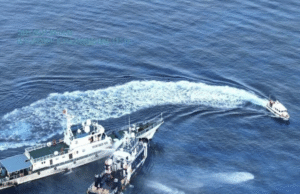Greece has signed a new defense agreement with France to acquire 16 Exocet anti-ship missiles, as part of a broader push to enhance its military capabilities amid ongoing tensions with neighboring Turkey. The deal was signed in Athens on Monday by Greek Defense Minister Nikos Dendias and his French counterpart Sébastien Lecornu during a one-day visit.
While the cost of the missile purchase was not disclosed, it marks another step in a growing defense partnership between the two countries. Greece has already procured 24 Rafale fighter jets and three Belharra-class frigates from France, with talks underway for the potential purchase of a fourth frigate. Additionally, France is supplying Greece with NH-90 military helicopters, and the two nations are working together on innovation in the defense sector.
Although both Greece and Turkey are NATO members, they have a long history of disputes over maritime boundaries in the Aegean and eastern Mediterranean, often bringing them close to military conflict.
“Greece does not threaten, but is threatened,” Dendias stated during a joint press appearance with Lecornu. The two ministers did not take questions from reporters.
After their official meeting, they visited the French frigate Alsace, currently docked at the port of Piraeus. Lecornu also met with Greek Prime Minister Kyriakos Mitsotakis during his stay.
This recent agreement builds on a broader defense and security cooperation pact signed between Greece and France in 2021, which includes a mutual defense clause—pledging support if either country is attacked.
Greece plans to invest €25 billion (about $27 billion) over the next decade in modernizing its military to meet the demands of advanced warfare. In a recent parliamentary address, Dendias outlined a shift in defense strategy—moving from traditional systems to a more high-tech, network-based approach. This includes mobile missile systems powered by artificial intelligence, advanced drones, and cutting-edge command and control units, aiming to reduce dependence on conventional military fleets.
Following years of austerity and defense budget cuts during the financial crisis from 2010 to 2018, Greece’s military overhaul now spans all branches of the armed forces, emphasizing collaboration with France, Israel, and the United States.













